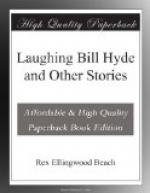As for Irving Francis, he watched the transformation with astonishment. Grudgingly, resentfully, he acknowledged that this was indeed fine acting. He realized, too, that his blind egotism had served merely to prove the truth of the author’s criticism and to emphasize his own shortcomings. The idea enraged him, but the spectacle held him enthralled.
Norma Berwynd was not slow to appreciate the truth. Accustomed thoroughly to every phase of the make-believe world in which she dwelt, she recognized unerringly in the new John Danton’s words and actions something entirely unreal and apart from the theatrical. The conviction that Henry Phillips was not acting came to her with a blinding suddenness, and it threw her into momentary confusion, hence her responses were mechanical. But soon, without effort on her part, this embarrassment fell away and she in turn began to blaze. The flame grew as Phillips breathed upon it. She realized wildly that her heart had always hungered for words like these, and that, coming from his lips, they carried an altogether new and wondrous meaning; that they filled some long-felt, aching want of which she had been ignorant until this moment. The certainty that it was Phillips himself who spoke, and not a mere character of his creation, filled her with an exultant recklessness. She forgot her surroundings, her husband’s presence, even the fact that the lines she spoke were not of her own making.
Never had the scene been played like this. It grew vital, it took on a tremendous significance. No one could have observed it and remained unresponsive. Francis let fall the manuscript and stared at the actors wonderingly. Since he was an actor, nothing was so real to him, nothing so thrilling, as the make-believe. He realized that this was indeed a magnificent exhibition of the artificial. With parted lips and pulse athrob he followed the wooing of that imaginary John Danton, in whom he could see no one but himself.
After a time he became conscious of a presence at his side, and heard some one breathing heavily. Turning with a start, he found Leontine Phillips at his shoulder. She, too, was aroused, but in her sneering visage was that which brought the actor abruptly out of his spell. She had emerged from the shadows noiselessly, and was leaning forward, her strong hands gripping the edge of the table littered with its many properties.
Mrs. Phillips had played emotional scenes herself, but never with such melodramatic intensity as she now unconsciously displayed. Her whole body shook as with an ague, her dark face was alive with a jealous fury which told Irving Francis the story he had been too dull to suspect. The truth, when it came home, smote him like a blow; his hatred for the author, which had been momentarily forgotten—momentarily lost in his admiration of the artist—rose up anew, and he recognized this occult spell which had held him breathless as the thrall of a vital reality, not, after all, the result of inspired acting. Instantly he saw past the make-believe, into the real, and what he saw caused him to utter a smothered cry.




